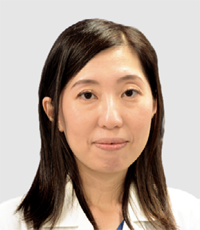Intensive Care Unit
Overview of the department

Chairman
Prof. Yuka Matsuki
Consultory system/therapeutic strategies
To improve the results of treatment and achieve early recovery, more appropriate treatment, strategies to control infection, and nutritional management are performed in cooperation with various departments, including attending physicians, physicians in the Intensive Care Unit, nurses, clinical engineers, specialists of each department, infection control/nutrition-supporting teams, and the Department of Rehabilitation. Satisfactory results have been obtained.
Advanced instruments
A system in which the following instruments can be safely used at all times has been established: electrocardiographs, blood pressure meters, pulse oximeters, invasive arterial pressure-measuring devices, central venous pressure-/central venous blood oxygen saturation-measuring devices, pulmonary arterial pressure-/continuous cardiac output-measuring devices, mixed venous blood oxygen saturation-measuring devices, various monitors such as electroencephalographs, blood gas analyzers, which facilitate prompt measurement, transesophageal echocardiographs, high-function respirators, hemodialysis systems, continuous hemofiltration systems, percutaneous cardiopulmonary support (PCPS) systems, intra-aortic balloon pumping (IABP) systems, biphasic direct current defibrillators, and percutaneous cardiac pacing systems. Severe-status patients with rapid changes and emergencies are accepted/managed.
Primary examinations and explanations
Vital signs are continuously monitored for critical-state surveillance. Simultaneously, all life functions are protected so that invasive treatment can be safely completed. Concerning brain death, a system to make accurate diagnoses and provide sufficient care for organ donors has been established to promote appropriate organ transplantation from brain-dead donors.
 University of Fukui Hospital
University of Fukui Hospital University of Fukui Hospital
University of Fukui Hospital +81-776-61-311
+81-776-61-311 Access
Access